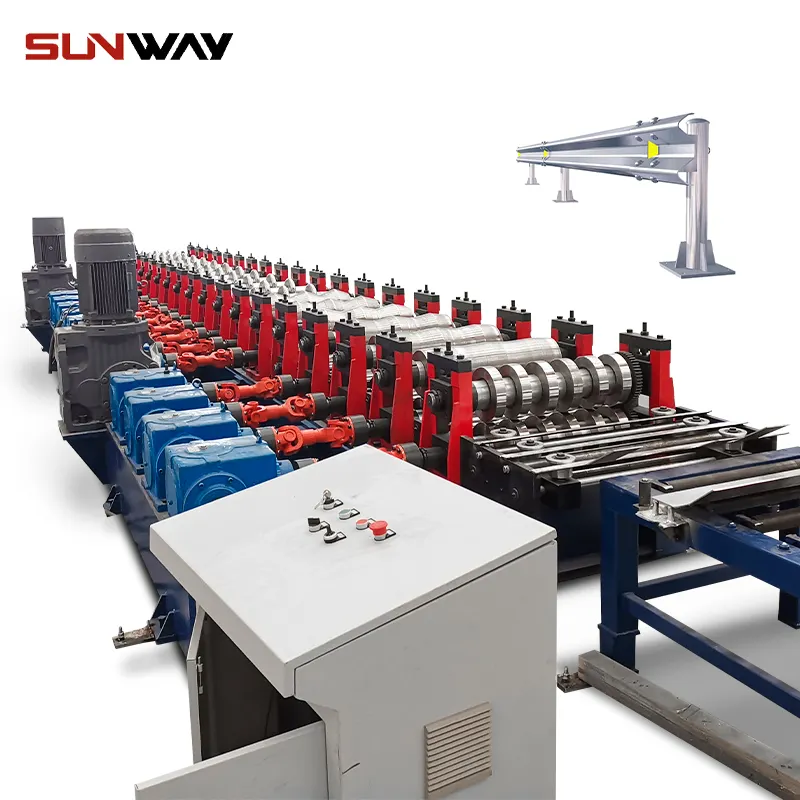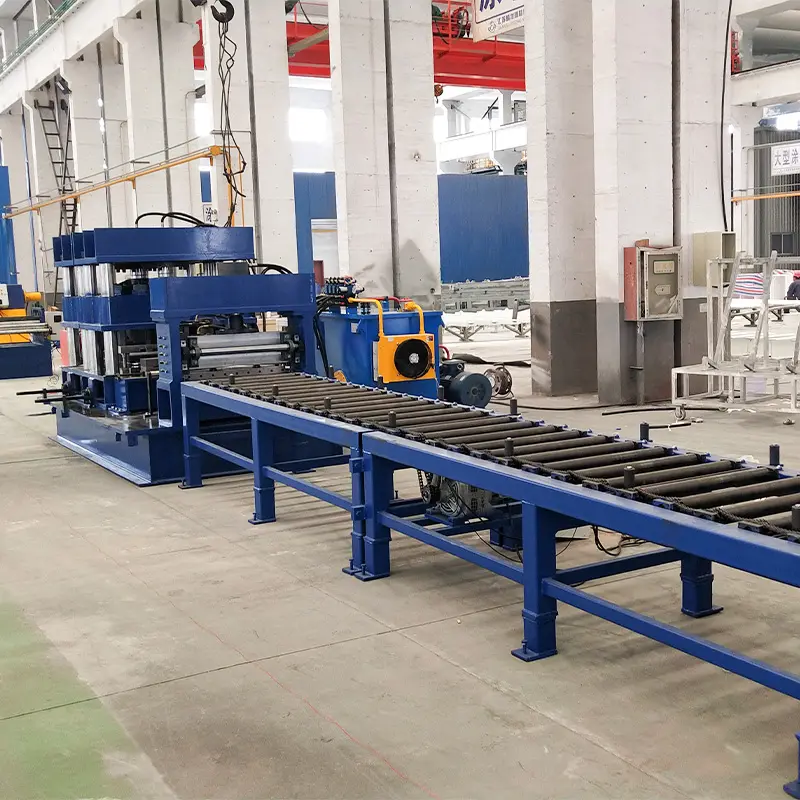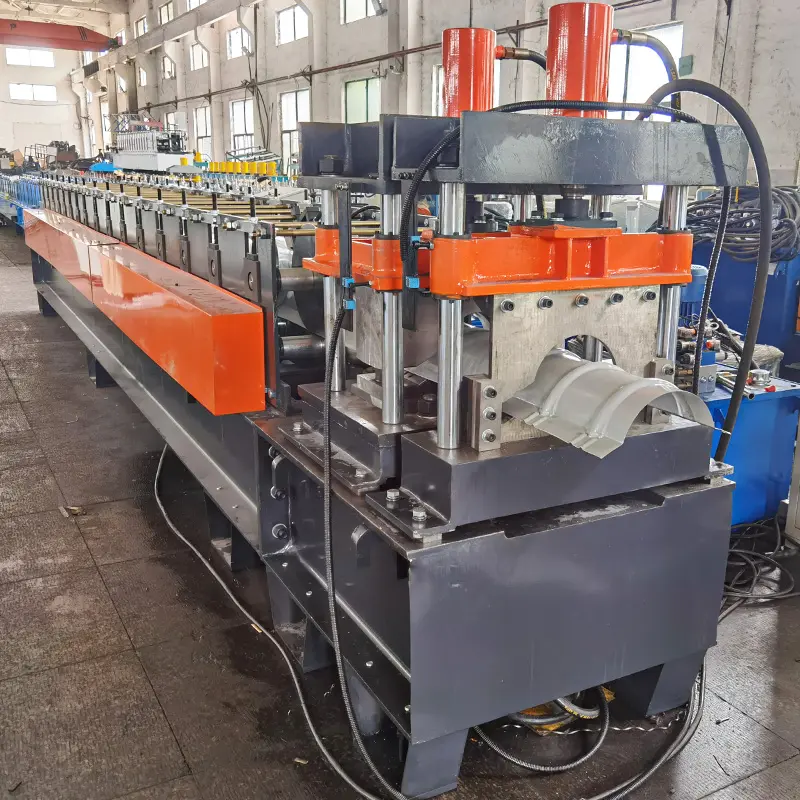ভূমিকা
In the world of modern construction and architecture, roofing plays a crucial role in protecting buildings from external elements. As technology advances, traditional roofing methods have been revolutionized, leading to the development of roofing tile roll forming machines. These machines have become the go-to solution for producing various roofing tile profiles in a cost-effective and efficient manner. In this article, we will explore what roofing tile roll forming machines are, how they work, their benefits, and the different types of roofing tiles they can produce.
What is a Roofing Tile Roll Forming Machine?
A roofing tile roll forming machine is a specialized equipment used in the manufacturing process of roofing tiles. It is designed to shape metal coils or sheets into specific profiles, allowing for the production of consistent and high-quality roofing tiles. The machine operates through a series of rollers and tools that progressively bend the material into the desired shape, creating uniform tiles that meet the industry’s strict standards.
How Does a Roofing Tile Roll Forming Machine Work?
The operation of a roofing tile roll forming machine is a well-orchestrated process. Initially, the raw material, typically metal coils or sheets, is fed into the machine. The material then goes through a series of rollers and dies, each responsible for bending and shaping the material. The design of the rollers and dies corresponds to the specific roofing tile profile being produced.
The machine’s precision and automated control ensure that each tile is uniform and has consistent dimensions. The continuous process allows for high production efficiency, making it a preferred choice for large-scale roofing tile manufacturing.

Benefits of Using a Roofing Tile Roll Forming Machine
Cost-Effective Roofing Solution
One of the most significant advantages of using a roofing tile roll forming machine is its cost-effectiveness. The machine’s ability to produce tiles at a fast pace reduces labor costs and overall production expenses. Additionally, it eliminates the need for outsourcing roofing tiles, saving further expenses.
কাস্টমাইজেশন অপশন
Roofing tile roll forming machines offer a wide range of customization options. Manufacturers can easily adjust the machine settings to produce different tile profiles, colors, and sizes according to customer preferences. This flexibility allows for creative freedom and meets the diverse needs of various roofing projects.
উচ্চ উৎপাদন দক্ষতা
Traditional tile-making methods can be time-consuming and labor-intensive. Roofing tile roll forming machines, on the other hand, offer high production efficiency. The automated process ensures a continuous flow of tiles, significantly increasing the output compared to manual production methods.
Durability and Longevity
Roll-formed roofing tiles are known for their durability and longevity. The precise shaping process ensures that each tile is uniform and fits seamlessly on the roof, providing excellent protection against the elements. Additionally, the materials used in the production are often of high quality, further enhancing the tiles’ lifespan.
Reduced Waste and Environmental Impact
Roofing tile roll forming machines are designed to minimize material waste during the manufacturing process. The precise shaping and cutting mechanisms reduce scrap, making it an eco-friendly option compared to traditional tile-making methods. This reduction in waste also contributes to a lower environmental impact.
Types of Roofing Tiles Produced by Roll Forming Machines
Concrete Roofing Tiles
Concrete roofing tiles are a popular choice due to their durability and versatility. Roofing tile roll forming machines can produce various concrete tile profiles, including flat tiles, interlocking tiles, and shingle-style tiles.
Clay Roofing Tiles
Clay roofing tiles offer a classic and timeless look to buildings. Roll forming machines can create different clay tile shapes, such as Spanish, French, or Mediterranean styles, adding elegance and charm to roofs.
Metal Roofing Tiles
Metal roofing tiles are known for their strength and longevity. Roofing tile roll forming machines can manufacture metal tiles with various coatings, providing excellent protection against rust and corrosion.

Factors to Consider When Choosing a Roofing Tile Roll Forming Machine
উপাদান সামঞ্জস্যতা
When selecting a roofing tile roll forming machine, it is essential to ensure that it is compatible with the material you plan to use. Different machines may be designed for specific materials, such as metal or concrete.
উৎপাদন গতি
The production speed of the machine determines how quickly it can produce roofing tiles. A faster production speed is ideal for large-scale projects with tight deadlines.
Profile Design Options
Consider the range of tile profiles the machine can produce. Having more design options allows for greater flexibility in meeting customer demands.
Machine Size and Capacity
The size and capacity of the machine should align with your production needs. A machine with a higher capacity can produce more tiles in a single run.
Automation Features
Advanced automation features can enhance production efficiency and reduce manual labor requirements, contributing to cost savings.
Maintenance and Care for Roofing Tile Roll Forming Machines
Proper maintenance and care are crucial for the longevity and efficiency of a roofing tile roll forming machine. Regular inspections, cleaning, and lubrication of components are essential to keep the machine in optimal condition.
How to Ensure Quality Roofing Tile Production
Achieving top-quality roofing tile production requires attention to detail and adherence to industry standards. Manufacturers should implement strict quality control measures throughout the production process.
The Future of Roofing Tile Roll Forming Technology
The future of roofing tile roll forming technology looks promising as manufacturers continue to push the boundaries of innovation. Here are some trends and developments shaping the industry’s future:
Advanced Materials
Manufacturers are experimenting with advanced materials to improve the durability, insulation, and environmental performance of roofing tiles. Composite materials, nano-coatings, and sustainable alternatives are being incorporated into the roll forming process to create tiles with enhanced properties.
Smart Automation
The integration of smart automation and artificial intelligence is revolutionizing the roll forming process. Automated machines can self-adjust settings, detect defects, and optimize production for greater efficiency and consistency.
শক্তি দক্ষতা
As sustainability becomes a priority, energy-efficient roll forming machines are being developed to reduce power consumption and minimize the industry’s carbon footprint.
৩ডি প্রিন্টিং
Additive manufacturing, such as 3D printing, is making its way into the roofing industry. 3D-printed roofing tiles offer unique designs, complex geometries, and lightweight structures, challenging traditional manufacturing methods.
ডিজিটালাইজেশন এবং ডেটা অ্যানালিটিক্স
Digital solutions and data analytics are streamlining operations, allowing manufacturers to monitor production in real-time, identify inefficiencies, and make data-driven decisions for continuous improvement.

প্রায়শই জিজ্ঞাসিত প্রশ্ন (এফএকিউ)
What is the typical price range of a roofing tile roll forming machine?
The cost of a roofing tile roll forming machine can vary significantly depending on its size, capacity, and features. Entry-level machines may start around $20,000, while larger, more advanced models can cost upwards of $100,000.
Can roofing tile roll forming machines produce different tile profiles?
Yes, modern roofing tile roll forming machines are designed to produce a wide range of tile profiles, including concrete, clay, and metal tiles. The machine’s rollers and dies can be adjusted to create various shapes and designs.
Are roll-formed roofing tiles as durable as traditional tiles?
Yes, roll-formed roofing tiles are known for their durability and longevity. The precise shaping process ensures that each tile fits perfectly on the roof, providing excellent protection against the elements.
How long does it take to set up and start producing tiles with the machine?
The setup time for a roofing tile roll forming machine can vary depending on its complexity and the operator’s familiarity with the equipment. Once set up, the machine can start producing tiles immediately.
Can the machine be used to produce other types of profiles besides roofing tiles?
Yes, roofing tile roll forming machines can be adapted to produce other types of profiles beyond roofing tiles. With the right adjustments, they can create various profiles used in different industries, such as wall cladding and floor decking.
উপসংহার
Roofing tile roll forming machines have revolutionized the roofing industry by providing a cost-effective, efficient, and customizable solution for producing high-quality roofing tiles. From concrete to clay and metal, these machines can create various tile profiles, catering to diverse architectural and design needs. As technology continues to advance, the future of roofing tile roll forming looks promising, with advanced materials, smart automation, and sustainable practices driving innovation in the industry.
Whether you are a construction professional, architect, or roofing contractor, investing in a roofing tile roll forming machine can significantly enhance your productivity, reduce costs, and provide top-notch roofing solutions for your projects.
So, as you embark on your roofing ventures, consider the benefits of roofing tile roll forming machines and stay at the forefront of the roofing industry’s technological advancements. Your buildings and clients will undoubtedly appreciate the durable, efficient, and stylish roofing tiles produced by these innovative machines.
Additional Frequently Asked Questions (FAQ)
1) What materials and thicknesses do Roofing Tile Roll Forming Machines commonly process?
Most machines handle pre-painted galvanized steel (PPGI), Galvalume (PPGL), aluminum, and occasionally copper or zinc, typically 0.3–0.7 mm for metal tiles. Heavier structural tile panels may run up to 0.9 mm with upgraded drive power.
2) How fast can modern roofing tile roll forming lines produce tiles?
2025 lines with servo feeders and flying shear/cutter achieve 8–20 m/min on stone-coated profiles and 20–45 m/min on standard metal tile profiles, depending on embossing depth and coating.
3) What features improve tile consistency and reduce scrap?
- Servo-controlled roller stands and automatic gap adjustment
- Inline embossing with temperature/pressure control
- Laser/encoder length verification and vision inspection for step depth, pitch, and edge waviness
- Recipe management tied to coil ID for repeatability
4) Can one machine switch between multiple roofing tile profiles quickly?
Yes. Cassette tooling or motorized stand adjustments reduce changeover to 10–25 minutes for similar profiles; 30–60 minutes if switching embossing patterns or deep-step tile geometries.
5) What certification or standards should manufacturers consider?
Look for CE/UL safety conformity, ISO 9001 for quality systems, ISO 14001 for environmental management, and material compliance to ASTM A653/A792, EN 10346, and coating standards like RAL/ACI color systems for PPGI/PPGL.
2025 Industry Trends for Roofing Tile Roll Forming Machines
- Smart automation at the edge: Low-latency PLCs with AI vision detect step depth variance and oil-canning, cutting rework by 20–35%.
- Energy optimization: Regenerative drives and hydraulic-on-demand lower energy use by 10–18% per ton of tiles produced.
- Coating durability gains: Next-gen PVDF and silicone-modified polyester systems claim 25–40% longer gloss/color retention in UV zones 3–4.
- Regionalization: Shorter supply chains push demand for compact, modular lines with 8–12 week lead times for standard metal tiles.
- Safety-by-design: Category 3/Performance Level d safety circuits and light curtains are becoming default on new lines.
2024–2025 Market and Performance Benchmarks
| Metric | 2024 Typical | 2025 Best-in-Class | Impact on Production | Source Notes |
|---|---|---|---|---|
| Line speed (standard metal tile) | 15–30 m/min | 30–45 m/min | Higher throughput | OEM catalogs; The Fabricator |
| Line speed (stone-coated tile) | 6–12 m/min | 12–20 m/min | Faster despite heavier coatings | Vendor datasheets |
| Length tolerance (±) | 1.5–2.0 mm | 0.5–1.0 mm | Less rework | Inline laser encoders |
| Step depth tolerance (±) | 0.8–1.2 mm | 0.3–0.6 mm | Better fit, aesthetics | Vision/AI QC |
| Energy intensity (kWh/ton) | 120–160 | 95–130 | Lower operating cost | DOE AMO guidance |
| Installed price (USD) | $80k–$220k | $150k–$380k | Depends on automation, embossing | 2025 RFQ ranges |
Authoritative references:
- ASTM A653/A792 coated steel: https://www.astm.org
- EN 10346 continuously hot-dip coated steel: https://standards.cen.eu
- U.S. DOE Advanced Manufacturing Office (energy efficiency): https://www.energy.gov/eere/amo
- The Fabricator (roll forming insights): https://www.thefabricator.com
- RAL Color System: https://www.ral-farben.de
Latest Research Cases
Case Study 1: AI Vision Cuts Scrap in Stone-Coated Tile Line (2025)
Background: A roofing products plant struggled with inconsistent step depth on stone-coated tiles, causing 4.8% scrap and frequent manual rechecks.
Solution: Integrated a vision system with edge AI to measure step depth and pitch in-line, tied to PLC for automatic roller gap micro-adjustments and reject gating.
Results: Scrap reduced to 2.1% (−56%); rework time down 38%; ROI achieved in 11 months; Cp/Cpk for step depth improved from 1.05/1.20 to 1.45/1.62.
Case Study 2: Energy Retrofit on Legacy Tile Mill (2024)
Background: A 2016-era roofing tile roll forming machine had high kWh/ton and hydraulic overheating.
Solution: Added regenerative VFDs, hydraulic-on-demand pump, and heat exchanger; implemented downtime auto-standby and coil-to-coil SPC logging.
Results: Energy intensity dropped from 152 to 118 kWh/ton (−22%); unplanned hydraulic stops cut by 70%; annual savings ≈ $48,000 at $0.12/kWh.
Expert Opinions
- Michael Klukas, Executive Vice President, The Bradbury Group
Viewpoint: “On roofing tile roll forming machines, servo flying cutoffs paired with inline metrology deliver the biggest yield improvement per dollar—especially on painted coils where rework is costly.”
Company: https://www.bradburygroup.com - Jennifer Kinder, Director of Product Management, Samco Machinery
Viewpoint: “Specifying coil grade, coating system, step geometry, and changeover method in RFQs lets buyers compare proposals fairly and avoid hidden costs.”
Company: https://www.samco-machinery.com - Dr. Ben Schafer, Professor, Johns Hopkins University
Viewpoint: “Geometric consistency in tile step and pitch reduces installation variability, improving wind-uplift performance and long-term watertightness.”
Profile: https://engineering.jhu.edu
Practical Tools/Resources
- Standards and design
- ASTM A653/A792 overview: https://www.astm.org
- EN 10346 coated steel products: https://standards.cen.eu
- Process quality and energy
- NIST SPC resources for manufacturing: https://www.nist.gov/manufacturing
- DOE AMO Motor/Drive tools: https://www.energy.gov/eere/amo
- Industry knowledge and sourcing
- The Fabricator buyer guides and case studies: https://www.thefabricator.com
- Precision Metalforming Association supplier directory: https://www.pma.org
- Representative OEMs for Roofing Tile Roll Forming Machines: The Bradbury Group, Samco Machinery, Dallan, Formtek (review profiles, speeds, automation options)
- Color and coating references
- RAL Classic/Design color systems: https://www.ral-farben.de
Last updated: 2025-10-22
Changelog: Added 5 targeted FAQs; inserted 2025 trends with benchmark table and sources; provided two recent case studies; compiled expert viewpoints with citations; curated practical tools/resources for Roofing Tile Roll Forming Machines buyers and operators
Next review date & triggers: 2026-04-22 or earlier if coating durability data or DOE efficiency guidance updates, OEM specs change speed/price ±10%, or new AI QC benchmarks shift best-in-class tolerances by >10%
